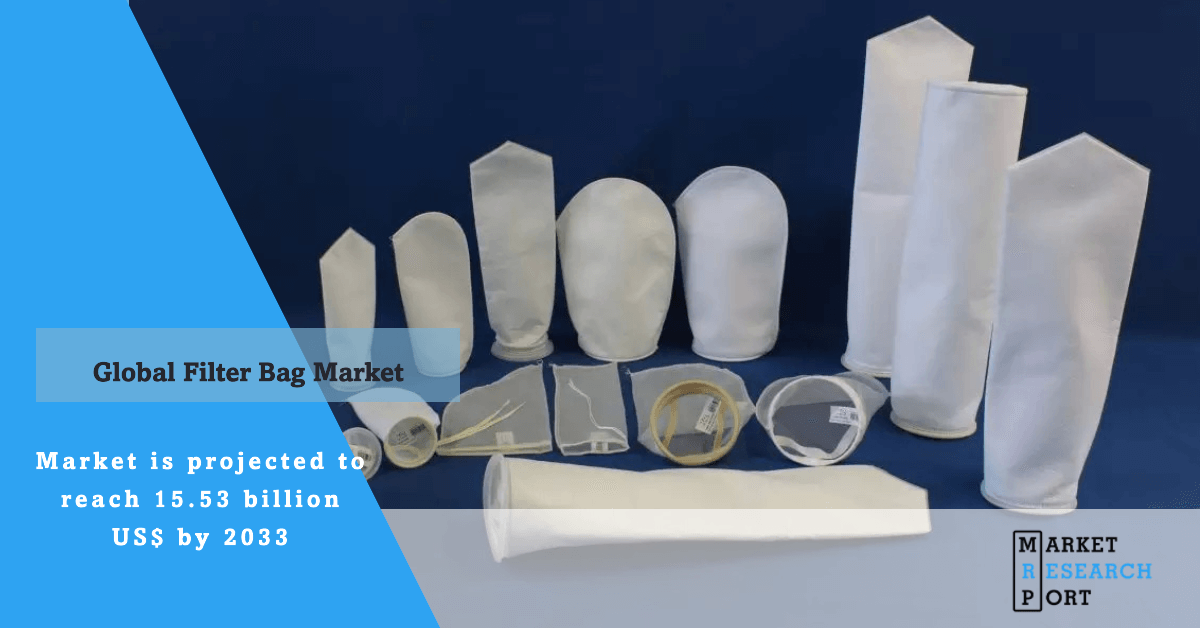
The global filter bag market was valued at USD 9.84 billion in 2024 and is expected to grow to USD 15.53 billion by 2033, expanding at a CAGR of 5.2% from 2025 to 2033.
Filter bags are widely used in industries to capture dust and harmful emissions during operations, making them crucial for environmental compliance and pollution control. The growing establishment of power plants, steel facilities, food manufacturing units, and other industries is driving the demand for these filtration solutions. Additionally, high-temperature industrial processes in sectors like oil & gas, mining, and metals further amplify the need for efficient air filtration systems.
Rising investment in industrial air quality improvement and stricter regulatory compliance are expected to foster opportunities for growth in the filter bag market.
1. Stringent Environmental Regulations
Governments worldwide are enforcing regulations to curb air pollution, which has increased the demand for industrial filter bags. These filters trap hazardous particles during production processes, helping industries meet emission norms. The surge in industrial activity—especially in sectors like cement, power generation, and metallurgy—has further intensified the adoption of filter bags.
2. Expanding Industrial Base
The expansion of manufacturing and processing industries, especially in emerging economies, is fueling the demand for filtration systems. Filter bags are essential in operations involving combustion, smelting, and chemical processing.
1. Slow Policy Implementation
Although many nations have introduced air pollution control policies, effective execution remains a challenge. Countries such as China and India face hurdles in enforcing these reforms, largely due to limited infrastructure and insufficient training in pollution monitoring.
2. Lack of Technological Accessibility
The absence of affordable and scalable air pollution control technologies, particularly in developing nations, has restrained wider adoption. This has slowed down compliance among small and mid-sized enterprises.
U.S. Mercury and Air Toxics Standards (MATS)
The U.S. EPA has mandated emission controls on coal- and oil-fired power plants to reduce mercury and other toxins. These regulations have led to the upgrade and installation of fabric filters in many facilities, creating a significant market opportunity for filter bag manufacturers.
Asia-Pacific currently holds the largest share of the global market and is forecasted to maintain this dominance. Industrialization in nations like China, India, Japan, South Korea, and Australia has increased the demand for filter bags across manufacturing, textiles, automotive, and mining sectors. For example, pneumoconiosis is a major health issue among industrial workers in China, increasing the need for improved filtration solutions.
Additionally, pharmaceutical production is growing in countries like South Korea, where filter bags are increasingly used in equipment like dryers and boilers.
North America is poised for rapid market growth, fueled by the region’s advanced manufacturing capabilities in chemicals, pharmaceuticals, and food processing. Stringent environmental laws and frequent upgrades in pollution control technology are supporting this growth. However, the higher cost of advanced filter bags may pose adoption challenges, especially among small businesses.
Europe’s bag filter demand is largely driven by its chemical industry, which is aligned with the European Union’s carbon-neutral goals for 2050. The region is undergoing a digital and green transformation under the Chemicals Strategy for Sustainability (CSS), creating further market potential.
These regions are expected to witness significant growth due to increasing environmental protection mandates and expansions in the oil & gas sector. Moreover, the rising production of electric vehicles in these regions is expected to drive demand for pulse jet filter bags in tire manufacturing and related industries.
Pulse Jet (Largest Share & Fastest Growing)
Pulse jet filter bags offer superior cleaning efficiency with low-pressure systems, making them ideal for industries like cement manufacturing. Their high air-to-cloth ratio and reduced maintenance needs contribute to their popularity.
Reverse Air
Shaker
Polyester (Leading Segment)
Due to its strong resistance to acidic environments and wide operational temperature range, polyester remains the most preferred material in filter bag manufacturing. Its durability and tensile strength make it suitable across multiple applications.
Nylon
Polypropylene
Porous PTFE Film
Non-Woven (Highest Contribution)
Non-woven filter bags are known for their durability and efficiency in high-temperature and high-flow applications. Their cost-effectiveness and customization options make them suitable across various industries.
Woven
Pleated
Donaldson Company Inc.
Pall Corporation
Thermax Ltd.
Mitsubishi Hitachi Power Systems Ltd.
BWF Envirotec
Eaton Corporation Inc.
Babcock & Wilcox Enterprises Inc.
Rosedale Products Inc.
Shanghai Filterbag Factory Co. Ltd.
GE Appliances
Certainly! Here are the most recent developments in the filter bag and industrial filtration sector, replacing the previous updates:
August 2024 – Donaldson Company, Inc. completed the acquisition of a 49% minority stake in Medica S.p.A., an Italian firm renowned for its hollow fiber membrane filtration technology used in medical devices and water purification. This strategic investment enhances Donaldson’s Life Sciences segment, aligning with its goal to expand capabilities in high-performance filtration solutions citeturn0search0.
August 2024 – Mitsubishi Power entered into a memorandum of understanding with Hygenco Green Energies to explore the development of green hydrogen and ammonia-fired gas turbine combined cycle (GTCC) power plants. Facilitated by the Japan International Cooperation Agency (JICA), this collaboration aims to support India’s National Green Hydrogen Mission by integrating Hygenco’s green fuel supply with Mitsubishi’s GTCC technology, promoting sustainable energy solutions both in India and globally.
The global filter bag market is on a robust growth trajectory, driven by environmental regulations, expanding industrial activities, and innovations in material and media technologies. Asia-Pacific remains a dominant force, while North America shows promising growth potential. With increasing emphasis on sustainability and cleaner production, filter bags are expected to play an increasingly vital role in industrial air pollution control through 2033.